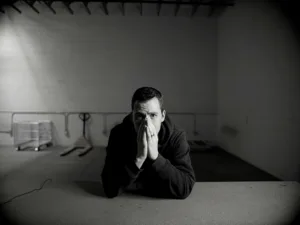Finding the right therapist can be a challenging task, especially in a culture that stigmatizes men’s mental health. Since men and women experience mental health symptoms differently, men can benefit from therapy specifically designed for them.
There may not be many choices in your area, or you may find it difficult to establish a bond with the therapists you meet.
A skilled therapist, on the other hand, can help you achieve mental wellness so it’s worth the effort to find someone who’s perfect for you.
In this post, we will help you understand why it’s essential to have the right therapist and how to find one.
When looking for a therapist who is suited to your individual needs, consider the following factors:
Specialization
Consider the therapist’s expertise before making a choice, and ensure that they are a licensed professional.
Therapy is not a one fit for all solution; in fact, research shows that clients matched to therapists based on their specialty see better clinical outcomes.
Consider the expertise of the therapist before making a choice, and ensure they are a licensed professional.
The most notable therapy niches are listed below:
- Couples Therapy: A type of psychotherapy that can improve and strengthen your relationship with your partner. It can address various relationship concerns, such as persistent arguments and feelings of detachment.
- Men’s Therapy: This type of therapy is designed specifically to help with men’s mental health. An expert therapist can treat various conditions associated with men, including stress, anxiety, depression, and anger.
- LGBTQ Focused Therapy: LGBTQ-focused therapy specifically aims to empower and address the unique needs of Lesbians, bisexuals, transgenders, gays, and queers. The therapist can help patients deal with concerns such as gender dysphoria and sexual identity.
- Addiction-Focused Therapy: Addiction-Focused therapy is an opportunity for individuals to discuss and treat substance use disorders. During these sessions, the therapist will help you form relapse prevention strategies in a comfortable non judgmental setting.
- EMDR (Eye Movement Desensitization and Reprocessing). A type of psychotherapy that helps people heal from emotional distress caused by traumatic life experiences through eye movements. It is used to treat various conditions, including trauma, anxiety, depression, and addictions.
Your Relationship With Your Therapist
A positive bond between the patient and the therapist is a cornerstone of therapy.
Many scientific publications suggest that the strength of a client-therapist relationship is a strong predictor of successful therapy outcomes, i.e., therapy is more likely to work if you feel comfortable, understood, and valued by your counselor.
The American Psychological Association (APA) notes that psychotherapy is a collaborative treatment grounded in dialogue and depends on the relationship between the service seeker and provider.
APA further states that psychotherapy aims to create a supportive and safe environment so the client feels safe to discuss painful emotions and negative life experiences that are contributing to their symptoms. It is essential to look for someone who makes you feel comfortable, safe, understood, and valued.
Over the years, multiple research studies have suggested that therapy seekers are most likely to benefit from therapy if there is mutual appreciation. You are more likely to open up if you feel connected to your therapist.
If it is honest and unfiltered communication, you are more likely to dig deep and share your thoughts and feelings which can help address the core issue behind the mental health condition.
Ask Yourself Who You Will Feel Most Comfortable With
We gravitate towards people with whom we feel most at ease.
The same rule applies when choosing a therapist. You must find someone you can trust and open up with for social, emotional and personality reasons.
Ask yourself if you would prefer an older female therapist or a male who is around your age? Choose someone you would be comfortable crying, laughing, and digging deep with.
Consider the following factors:
- Age. Would you feel comfortable with someone older, younger, or around your age?
- Gender. Would you feel more at ease speaking with a male, female, or nonbinary therapist?
- Ethnicity. Do you believe your relationship with the therapist will be impacted by their ethnicity?
- Political Views. Would their political views influence your working relationship?
- Religious Affiliations. Does their religious affiliation matter to you?
Practical Considerations
Your choice of a therapist also depends on pragmatic factors such as affordability and distance.
Choose someone that ticks all the boxes as these elements contribute to your relationship with the therapist.
- Format. Do you want to attend therapy online, in-person, or on the phone?
- Location. Would you prefer a local or an international/transcontinental therapist?
- Specialization. Are you looking for someone with particular expertise?
- Cost. What is your budget?
- Insurance. Is the therapist covered by insurance?
Where to Search for the Right Therapist
Men are often reluctant to seek therapy due to the stigma associated with it. Although things are changing for the better with initiatives like men’s mental health month, it’s still not easy to find the right therapist.
When looking for therapists for men, there are various sources you can consider.
Some of these include:
- Recommendations from your friends and family
- Referrals from a social worker or doctor
- Non-profit organizations that raise men’s mental health awareness. Check out Fishing The Good Fight.
- Online therapy directories and platforms
- Your health insurance provider’s directory. Be aware of the risks of using insurance for psychotherapy.
Whether you choose a therapist recommended by a friend or from the insurance directory, there is a 50-50 chance that you will develop a positive therapeutic alliance with them. Until you consult with the therapist, you won’t know if they are the right fit for you.
Research indicates that therapy seekers matched to therapists by online platforms that use client preference and algorithms were more satisfied with the therapy and saw better clinical outcomes than traditional methods.
If you are looking to find therapists for men and are unsure where to find the right one, try our therapist match survey to search for the perfect match for your needs. Good Luck!






